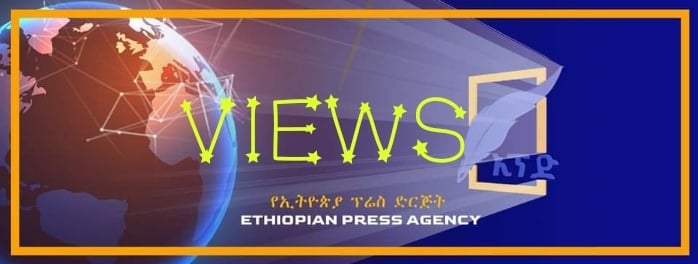
BY BLEN M DIRIBA
Election is the cornerstone of democracy, a requisite political process in the effort to ensure democratization and political stability. Through elections, office holders obtain their political legitimacy and democratic mandate to rule and govern as they deem proper; while being held accountable for their performances in office. It also enables ‘democratic’ governments to translate the choice and preferences of citizens/voters into policy, laws and regulations. In consideration of that, Abiy Ahmed’s administration has held its ground to stand by its continued commitment towards the conduct of the upcoming election despite the continued foreign and domestic pressure to disrupt the election for security reasons that reportedly arise from the perturbation related to ethno-religious tensions, the Tigray crisis and GERD related issues.
Similarly, political parties such as EZEMA, NAMA, ENAT, HIBER and so forth [40+ to be exact] have supported the government in this stance – some with and some without reservation. The important point to analyze here, however, is why the government insists on holding the election despite the international and domestic concerns relating to security, institutional efficiency, logistic wise readiness and other related issues? Here is why:
A Path to Democracy and Political Stability: A Chance to Break Out of the Conflict Trap:
As stated above, the upcoming election, be it democratic or not, is a guarantee that Ethiopia is not backsliding from electoral politics, which is foundational in any democratic movement. And given the fact that Abiy Ahmed inherited a nation that is transitioning from 3 decades of autocracy, it would be logical for Ethiopians and the international community to perceive this election as a significant path to the long awaited democratization and political stability of Ethiopia – a nation that has long been ravaged by violent movements.
The election has more of a significant long term political implication than short term – given the fact that elections being held is of fundamental contribution towards building democratic governance and establishing voting as a civil right and a civil duty towards which generations have fought for. Holding periodical elections will also significantly contribute towards minimizing armed rebellions and violent mass mobilizations that often obstruct democratization and development, and succeed in nothing more than replacing one form of authoritarianism with another. It will help the government (be it Abiy’s or whoever wins the election) the confidence to ensure political stability by adopting any legitimate means necessary.
The election will also provide the upcoming government a position of leverage against chaos entrepreneurs in the conduct of substantiated political negotiations – paving the way for a more engaged citizenry and a well organized civil society, and fostering the path to democratization despite the inevitable challenge of transitions. It will enable the government to dilute the dangerous concentration of central authority inherited from the TPLF and distribute power equitably – reducing the possibility of chaotic political environment in the face of growing separatists [TPLF, OLF] and irredentist [Sudan] demands.
In other words, the election would bring clear political benefits by diminishing separatist agitations through thoughtful distribution of power to elected officials at local, regional and national level – in ways that deepen and sustain unity and democracy.
The election will also lay the foundation for the much anticipated political reforms regarding the TPLF separatists influenced FDRE constitution that is criticized for its clear anti-united-Ethiopia and anti-Amhara orientation; thereby addressing issues related to arming regional forces, regional arrangements, ethnic federalism, ethnic politics and so forth that are undeniably fueling Ethiopia’s ethnic tensions and crisis for the past few decades. Therefore, it is sound to conclude this election will likely lead Ethiopia towards successful democracy and political stability – as diplomatically aligned with the legitimate interest of the country’s western partners who invested a lot in this regard [and now staggeringly oppose Abiy Ahmed’s initiative to move Ethiopia towards democracy and development].
A Path to Legitimacy and Accountability: Government Power and Responsiveness:
Abiy Ahmed’s critics and opponents usually refer to him as the ‘Unelected Prime Minister’ – a manifestation of clear lack of understanding of Ethiopia’s political system – whereby the public elects a party that later elects its chairman/woman – making him/her the prime minister by default. The Ethiopian people “ELECTED” EPRDF on a 2015 election whereby they dishonorably claim a 100 percent victory – which later chose Abiy Ahmed as a chair of the party after the former PM HaileMariam Desalegn’s unpredicted and unprecedented resignation following the growing anti government protests all over the country. This makes Abiy Ahmed not only elected prime minister, but also a legitimate leader of the ancient African nation.
Nonetheless, the dissolution of EPRDF and formation of Prosperity Party under his leadership while he remains the PM creates lots of confusion about his legitimacy to lead the nation as a PM within the political structure of a party that is not directly elected under the “Prosperity” name and political manifesto. As a result, the upcoming election might help Ethiopians and the international community have that clarity as he will legitimize his power position [if he wins] by officially accepting the right of his party, himself, and his public officials to hold office and to promulgate national, regional and international policies.
It will further enable him to gain public confidence and wield power to reinforce the stability of the nation, and accountability of the political community to the larger public. In doing so, it will resolve the principal agent problems that are now prevalent in the current socio-politics of Ethiopia – and help ensure government responsiveness and accountability [which are usually undermined in the absence of elections]. Therefore, it will be of immense benefit in this regard if the election is to be held.
A Path to Self Actualization and National Integration/Unity:
Regardless of the numerous other socio-economic needs and political/security demands, the participation of Ethiopians in the upcoming election serves to reinforce their self-esteem and self-respect as a citizen – it gives them the opportunity to have their say through partisan expression – enhancing their sense of belongingness in the national political discourse.
Even by objecting to vote, or political parties isolating themselves – satisfies the need for Ethiopians to express their feeling towards/against the existing regime – or their alienation from the general political community. In other words, it serves the purpose of confirming the worth and dignity of individuals as citizens and humans, as well. For precisely these reasons, and in due recognition of the long battle for democracy [right to vote and equal electoral participation] – Ethiopia should proceed with the election to fulfill the personal cravings [for democracy] of citizens. In addition, the upcoming election will likely create a link or embolden the common factor as voters cast their vote as Ethiopians rather than Oromo, Amhara, Gurage, Sidama, Somali, Tigre or whatever. This in a way confirms the viability of the polity and fosters socio-political integration among the people.
It might also be a step forward to dismantle ethnic politics from its roots and ease ethno-religious tensions that are escalated by political entrepreneurs and beneficiaries of the ethnic quota political arrangements. The election will most likely grant the upcoming regime the power, legitimacy and confidence to take bold measures that helps bring a lasting solution for the half a century of socio-political crisis in Ethiopia and foster Ethiopian nationalism. To mention but few, such measures may be constitutional reform, including but not limited to banning ethnic politics, disarming regional special forces, reframing the federal arrangements and so forth.
A Path to Macro Economic Stability and Inclusive Growth:
Ethiopia is a rich and resourceful country, impoverished as a consequence of the irresponsible (and at times, deliberate) acts of internal traitors and foreign actors – setting economic and sociopolitical traps. The inefficiency, negligence and corruption on the side of the government, most particularly the TPLF-led-EPRDF, has also a significant role in impoverishing the country – while delivering cosmetic infrastructural development as a result of which it was showered with praise from its western partners.
However, Abiy Ahmed has inherited an economy that was in peril, a nation that was on the brink of complete collapse. Even though he managed to sustain the economy of the nation subsidized [Fast Cash Injection] by friendly nations and governments, like the UAE – Ethiopia’s economy is yet faced with serious challenges.
The TPLF’s nearly absolute dominance in the economy, their deep rooted corruption, money illicit and money laundering – at times printing fake money and injecting it to the market – has resulted in high inflation. This has been done intentionally to cause public outrage and rebellion against Abiy Ahmed’s administration – which is trapped between the past and the future, i.e. economic crisis and economic reform, respectively – and yet striving not only to overcome the imminent economic challenges, but also to ensure macroeconomic stability and sustainable growth.
The current administration has introduced many vital measures such as increased budget transparency, economic and investment policy reforms, inclusive strategies to nurture a strong middle class and so forth – thereby slowly neutralizing the precipitated economic crisis aimed at triggering serious economic shocks [rising food prices and youth unemployment] that ruptures the government and the state.
Thus, going forward with this election, reasserts the anticipation of democracy as it likely ensures that Ethiopia is heading towards economic stability, prosperity and inclusive growth – which inevitably leads to a commensurate increase in socio-political and economic freedoms. Such an increase raises citizens’ expectation for socioeconomic opportunities to improve their living standards and foster social inclusion – resulting in rewarding politicians with powerful feedback that stimulates democratization and minimizes the risk of sliding back to autocracy.
Nonetheless, tempting as it may be to impose your will on a sovereign nation through economic sanction, the current US sanctimonious action on the Ethiopian government might unfortunately pause a serious challenge if they pushed any further and force the government down through autocracy to survive. And any attempt to block Ethiopia’s election, thereby blocking the current path to prosperity and democratization will only create a breeding ground for strongmen.
International actors should rather play a vital role in supporting the domestic socioeconomic and political reforms [the election being one among many] through development grants, loans, debt cancellation, and so forth to help create an important fiscal and political space for the Ethiopian government to deliver on the public demand for a new democratic social contract.
A Chance to Promote Regional Stability:
Advantages of History and Geopolitics: Ethiopia has always been an important political figure both in regional and global politics – the prize of her glorious past [history] and geopolitics. The country has a significant political influence in Africa’s political history – dating back from the struggle for colonial independence and the formation of the OAU – to the resistance against the neocolonial global political order and the ‘New Scramble for Africa’. Ethiopia is also a strategically significant nation in the terror ravaged Horn of Africa – a region with rising relevance in the escalating geopolitical rivalry between China/Russia and the west. As a result, political stability in Ethiopia defines the general stability of the HOA – with significant impact on regional security [extending from the Horn to the Middle East] and international trade [The Red Sea and Bab-el-Mandeb trade route interlinking Africa, Europe, Asia, and the Middle East].
The upcoming election might enable Ethiopia to make use of its geographic and sociopolitical leverages to exert a powerful force on the trajectory of regional and global politics – enhancing the interdependence between African nations and the west, China, Russia and/or any state with legit interest in the region. With that note, the international community must strive to support Ethiopia’s contemporary fragile democracy to flourish through the practice of electoral politics – by providing critical economic and technical assistance and avoiding destructive political pressure that hinders the country’s vital role to positively influence the Horn and the rest of Africa in a mutually beneficial manner.
Concluding remark
The upcoming election has put Ethiopia at the crossroads – it is not only a choice between Abiy Ahmed’s government and his opponents – but also a choice between democratic future and autocratic history and a choice between a sovereign Ethiopia or a neo-colonized one. When citizens vote in a few days, they are voting to have [or not] a legitimate leader that ensures a better socio economic future for them and their children, and an advanced political future for Ethiopia – both in local, regional and global politics. This election is one of a kind that makes or breaks Ethiopia’s lasting hegemony as a sovereign nation, and ensures the continued existence of Ethiopians as the sovereign people that they are [or not].
The Ethiopian Herald June 15/2021



